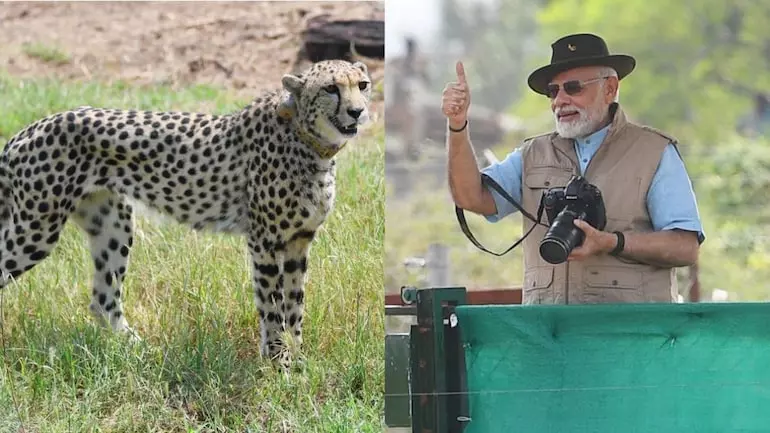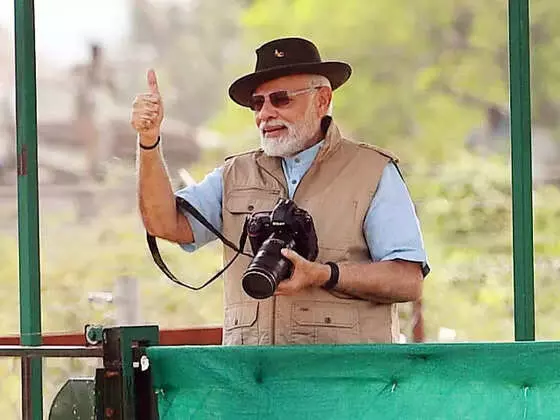
Politics even in Cheetahs?
text_fieldsEight African cheetahs, who have travelled 8000 km from the African country of Namibia to reach the protected forest area of Kuno National Park (KNP) in Madhya Pradesh, India, are seen as an asset to our depleted wildlife. The cheetahs, five females and three males, can live in a special reserve of six square kilometres for the time being. After ascertaining whether they are really compatible with the Indian environment, they will be released into the five thousand square kilometre forest. Soon another group of cheetahs is to arrive from South Africa. Officials say these 12 will have followers, and up to 40 cheetahs will be migrated to India. It is estimated that the cheetahs that once had gone extinct will once again have a large presence in the Indian terrains as they multiply in a favourable environment. Independent India was born without the species 'Indian Cheetah' itself. Maharaja Ramanuj Pratap Singhdev, who ruled the Korea princely state of present-day Chhattisgarh until 1947, killed three cheetahs in a hunt, marking the end of the Asiatic cheetah family in India. In 1952, it was declared that there were no more cheetahs left in India. It is believed that the return of cheetahs after 70 years will provide strong support for wildlife diversity. Experts are divided on whether this migration of the feline family will have the desired effect.
But it is unfortunate that it became the subject of a partisan political feud. What is sadder is that it is the Central government itself that has tried to mix politics in such an important national programme. There are even some who ask whether a project that belongs to the whole of India has been reduced to a birthday celebration by linking it to the Prime Minister's birthday. Whether that argument is true or not, Prime Minister Modi's remark that no effort had been made to reintroduce cheetahs for 70 years was a bit overstretched. That statement is also an accusation against previous governments. Modi also explained that this 'Project Cheetah' to bring back cheetahs belonged to his government. The truth is the opposite. The idea of 'Project Cheetah' was born in 2009 before the Modi government. Minister Jairam Ramesh in Manmohan Singh's government took the initiative for it. Long before that, in 1972, the Wildlife Protection Act was passed too. Accordingly, many programs were launched to protect wildlife and increase biodiversity. Project Lion was launched in 1972, and Project Tiger in 1973. Efforts to bring cheetahs from other countries started during the Indira government. African cheetahs are different from the cheetahs here. Aiming for the Asiatic cheetahs that are better suited here, they contacted Iran, where there were a few left. Those efforts got stalled during the Emergency. After the fall of the Shah in Iran, the country decided to protect the remaining cheetahs there itself. Later, after some deliberations and studies, the UPA government decided to bring in African cheetahs. That is how the program was formulated in 2009. When the UPA government started implementing the program to bring cheetahs from Africa in 2010, it was questioned in the Supreme Court. The court accepted the amicus curiae's advice against bringing from Namibia and stayed the program in 2012. In 2013, the court dismissed the program entirely. But, there is no need to stop programs just because of the change of government. In 2017, a review petition was filed in court during the Modi government. It pointed out that the technical conditions had already been met before the court rejected the project in 2013. By 2020, the court approved the scheme on a 'trial basis'. In short, efforts to 'own' the first three cheetahs by opening their cages by the Prime Minister on his birthday have dimmed the lustre of a project that was delayed due to necessary judicial review and remedial measures.
The mission does not end at bringing the cheetahs: there are examples of such wildlife migrations ending in extinction. Care must be taken to ensure that cheetahs that leave the African grasslands and migrate to the dense forests of India survive. What is needed is science and commitment, not politics. But, it may also be reminded that the Biodiversity Amendment Act (2021) passed by the Modi government was a serious, anti-scientific move in favour of environmental exploiters. N one with an understanding that biodiversity is not about bringing a few cheetahs and flourishing tourism, but it should be holistic, all-encompassing and inclusive, will confuse it with petty political interests.


























